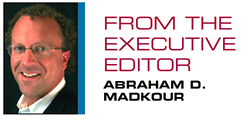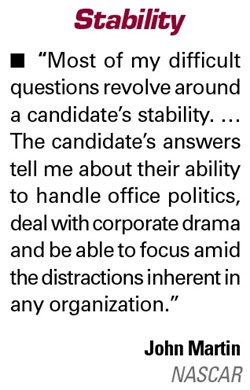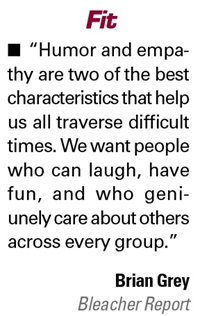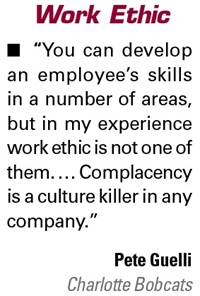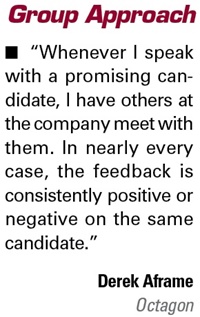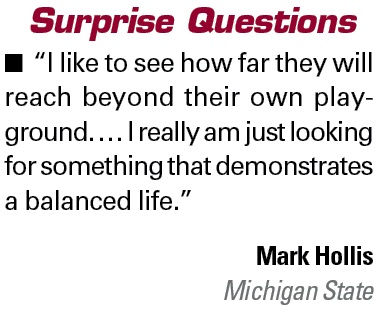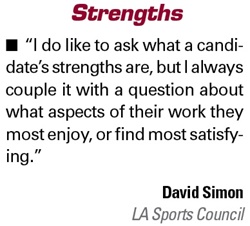I’ve always found the job interview process to be one of the most challenging aspects of management. It’s also one of the areas where I have sought the most guidance from friends and colleagues. Over the years, I’ve received some great ideas and advice, so I thought it would be good to reach out to some of the people I know who are closely engaged in the hiring process and hear their thoughts about what they look for in assessing talent in the workplace.
> John Martin, managing director at NASCAR Digital Media, recently hired about 70 people at NASCAR.com and outlined the approach that helped him build the team. “My process for interviewing breaks down into three categories of questions. First, stability. Second, curiosity. Third, capacity. Most of my difficult questions revolve around a candidate’s stability. I try to find out their personal goals, fears, biggest mistakes, accomplishments, lifestyle, interests, etc. It allows me to hone in on the candidate’s fit for the organization. Also, the candidate’s answers tell me about their ability to handle office politics, deal with corporate drama and be able to focus amid the distractions inherent in any organization. Additionally, I can tell if they are a long-term employee or just looking for a two- to three-year stint based on these questions.
“The key mistake I learned through experience is not to hire someone because you ‘like’ them in the interview process. Liking the candidate does not necessarily mean they are equipped for your role. My stability questions can eliminate a candidate if ‘red flag’ answers come out. My curiosity questions center around work ethic. Is the candidate a problem-solver? Will they look at things differently? Are they self-motivated, or do they need a lot of direction? Can they think analytically? These questions do not eliminate a candidate, but it lets me know if they are right for the particular role we need to fill. Capacity really means ‘can they do the job.’ I always want to probe their past experience. I also find these questions can tell me about my first two categories when candidates elaborate about previous jobs. One of my other keys is to ask the questions randomly to make sure the candidate doesn’t contradict previous answers. I will also re-ask a question if a candidate ‘missed’ the answer. It is a telltale sign to see if the candidate can take direction and feedback.”
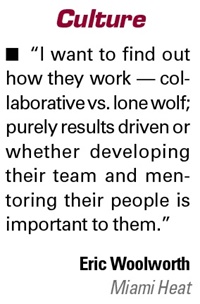 |
>At the Miami Heat,
Eric Woolworth, president of business operations, recently hired a top-level executive and shared his process: “Because by the time someone gets to me there is no question they are qualified for the job, I am looking to hear less about the things they have accomplished in their career and more about how they would fit into our culture here at the Heat Group. I want to find out how they work — collaborative vs. lone wolf; purely results driven or whether developing their team and mentoring their people is important to them; whether they fully grasp and appreciate that in this industry, whatever your job function, everyone is in the customer service business.
“I will also look at how developed and polished their interpersonal skills are, and what kinds of things they like to do when they aren’t working. Particularly as it relates to senior executives, we are looking for people that are not only highly qualified, but people that are going to appreciate and fit into a culture that values collaboration, mutual respect, team-building, and really values being part of a highly functioning team. It is critically important that for everyone’s sake we hire a person that we are all going to enjoy spending our time with, while they are, of course, kicking ass in their functional area.”
> Bleacher Report CEO
Brian Grey reviews more than 100 résumés/CVs a year. He told me he focuses on three areas in the interview process. “First, are they team players? The hardest thing to evaluate is whether someone can truly operate in a way John Wooden described as ‘teams win when nobody cares who gets credit.’ There are no silos in digital, so I look for real examples — playing on a team, stage directing in drama department, leading a team in a previous job, etc. — that demonstrate a person can work with anyone to make things happen. We are living in a world where social media promotes a ‘look at me’ culture, but it’s still about performing in a cross-functional environment that wins.
“Second, a drive to succeed. I listen for examples of success — and failure — in the context of trying to create or build something. When have they put themselves ‘out there’ to get something done, even if it didn’t work out? Here you can also get a sense of their ability to think strategically. And then I look for humor and empathy. There are good days and not so good days in everyone’s lives and in every business environment. Humor and empathy are two of the best characteristics that help us all traverse difficult times. We want people who can laugh, have fun, and who genuinely care about others across every group. In the end, it’s these qualities in people across your team that really create a culture that is genuine and sustainable regardless of the environment that swirls around the business.”
> Pete Guelli, executive vice president and chief sales and marketing officer for the Charlotte Bobcats, recently conducted some senior-level interviews, so his process was top of mind. “Missing on a key hire can set your organization back significantly, and a poor hire can have a devastating impact on morale. Many executives I respect have missed on hires, and I have made my share of mistakes. However, there are some things that have helped us become more successful. A committee approach. For key hires, we created a committee of people to interview candidates. The committee approach is not unique, but I believe the composition of the committee is. We utilize high performers and model employees regardless of their discipline or tenure. The interviews are conducted by people that have been successful in our culture. This helps us pinpoint candidates that truly fit our organization. Also, the employees are vested in the process, leading to hires that are more widely accepted in the company.
“Avoid the typical questions: I don’t advocate asking the typical interview questions. Most candidates are prepared for them and you don’t get a real feel for what this person might be like to partner with in the workplace. I prefer to walk them into a small group setting and let them participate in some way. This format gives you an opportunity to see how they interact. Do they have a collaborative style? How do they express their point of view? How do other staffers react to them? My favorite question to ask is: If you could change something about your current company, what would it be? The answer in many cases gives you some real insight into the type of perspective they have. Is it a legitimate concern? Does it focus on their personal success or the company’s success? Also, be thorough. Don’t shortchange the background work.
“Finally, for me, there are a few specific qualities that are very important in any hire — loyalty, competency and work ethic immediately come to mind. The one that stands out for me is work ethic. You can develop an employee’s skills in a number of areas, but in my experience work ethic is not one of them. It is also happens to be the most difficult attribute to ascertain from an interview. Complacency is a culture killer in any company.”
> Derek Aframe, senior vice president at Octagon, speaks to about 100 job candidates each year, from those seeking informational interviews to candidates for senior positions within Octagon or with clients. “I focus on trying to divine if they know how to get the job done,” he told me. “I try to determine if they have both ‘wings and roots’ — if they have creativity, big ideas and big thoughts, but also a pragmatic, practical, operational, and sensible side to get things done. The best candidates have both ‘wings and roots.’ I’m also looking for a balance of ambition and humility, dedication and commitment to client service. I want candidates to demonstrate a passion and show they care and invest their personal pride in doing a great job. The key is recognizing all personality types can have that fire and spark, it may just be more understated in Type B’s. When I joined Octagon, I interviewed with 14 separate people, in some cases more than once. This not only gave me a great feel for the company, but showed the priority it placed on the position and ensuring the right mutual fit. Whenever I speak with a promising candidate, I have others at the company meet with them. In nearly every case, the feedback is consistently positive or negative on the same candidate.
“Also, specificity is key — specific examples of what they have done and how they might handle certain situations goes a long way to determining how they would think and act in the role. I’ll ask about current events connected with the position, the sport, our company, or the industry, to demonstrate if they have done their homework. I put a lot of stock in the type of questions they ask me — it shows their ability to comprehend information in real time and how well they listen.”
> At Michigan State, Athletic Director
Mark Hollis interviews candidates for head coaching and administrative positions, and when narrowing his field of candidates, he looks at “experience, as well as the frequency of shifting from job to job and time gaps in positions. I look at their level of success elsewhere, from their direct contributions to winning teams on or off the field, to their mentors and contacts and their networking ability.” He also has a point ranking of his assessment of how he sees the candidates as they relate to a number of areas: administrator; leader; motivator; tactician; teacher; counselor; evaluator; spokesman; decision-maker; financial planner; community leader; salesperson; communicator; visionary; disciplinarian and winner.
Some of his nontraditional questions? “What is the most recent thing you learned that globally helps you do your job better?” Why that? “I like to see how far they will reach beyond their own playground. Do they have examples of learning from business leaders, areas of business other than their own — the arts, for example. I really am just looking for something that demonstrates a balanced life, more than just sports.” He also asks, “If offered the position, who are the first five people that you would call to tell them you got the job?” What is he looking for there? “I am looking for a diverse population of people that would be reasonable to provide mentorship, counsel and advice.” He also likes to surprise and ask, “Are you qualified to do this job?” Why that one? “I just like to see how people react to this one. Are they arrogant? Confident? Passive or apologetic? How do they react with the shock question?”
> David Simon, who helped create the Los Angeles Sports Council in 1987 and 1988 and has served as its president ever since, meets with numerous job seekers. “There is a school of thought in job interviews that encourages candidates to pontificate about their strengths and weaknesses,” he told me. “I have never asked anyone to tell me about their weaknesses, because I think the question puts them in an unfair position. After all, a totally honest answer could cost them the job they are applying for. I do like to ask what a candidate’s strengths are, but I always couple it with a question about what aspects of their work they most enjoy, or find most satisfying. Sometimes there is a disconnect, such as the skillful writer who may find the creative process to be painstaking and who would prefer a root canal to a writing assignment. That is a red flag for me when it happens. I want to be sure that someone likes doing the things they are good at, so that they can be both productive and satisfied.”
 |
> Finally, Bonfire Group principal
Chris Zimmerman has recruited top executives throughout his career in sports business and ran organizations ranging from 100 employees to 1,000 in previous stints at Nike Bauer Hockey, Canucks Sports & Entertainment and Easton Sports. He shared with me what he looks for: “Passion. Over the years, I have found that this is one of the strongest indicators of future performance. I want to understand what activities, causes, hobbies or other interests get the blood flowing for the person. People who have shown great drive and passion in prior roles or personal pursuits are most likely to bring that energy to our organization. Second, curiosity. The ability to think about new ways of attacking problems and addressing changing consumer behavior is extremely important to me. I like to hear how the candidate thinks about the future and how our company and industry may evolve over time. Team/leadership style. Most of the business world today revolves around team integration and collaboration. I want to get a sense for how the candidate works in teams. If the position is a senior role, what teams is the candidate most proud of? And how would team members describe the leadership traits of the candidate?”
Strong ideas and suggestions, and I want to thank each of them for sharing. I’ll share more thoughts as I receive them about this challenging topic.
Abraham D. Madkour can be reached at amadkour@sportsbusinessjournal.com.


